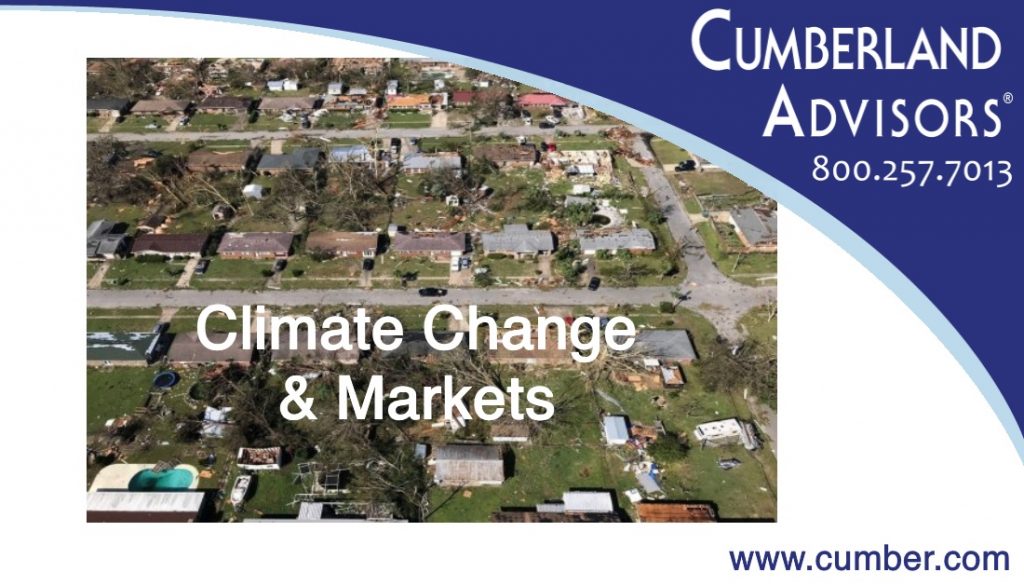Why did Hurricane Michael intensify so quickly? And why was the Western US so hot and dry this summer? And what about climate change all across the rest of the global landscape and seascape? And what do I do with my portfolio?

There are still many climate change deniers. But that cohort shrinks as more and more hard evidence overwhelms former assertions and opinions. A storm surge destroying Mexico Beach is a televised fact. So is a record low level of water in Lake Mead. These realities and a hundred others are facts reflecting climate-based causality.
Climate policy and energy policy are a current test of the ability of our political leaders and of markets to handle the challenges of cognitive epistemology. We’ve written recently about cognitive functioning, so there is no reason to repeat that discussion here. If you missed it, here’s the link: https://www.cumber.com/markets-cognitive-epistemology/.
On climate change we will refer readers to this Bloomberg link: https://www.bloomberg.com/news/articles/2018-09-26/how-the-climate-change-debate-has-shifted-not-ended-quicktake. Please take a few minutes to peruse it. And then take a very deep dive into the latest report from the Intergovernmental Panel on Climate Change (IPCC), which released its special report Global Warming of 1.5°C earlier this month. That report is available here: http://www.ipcc.ch/report/sr15/.
Now let’s look at US policy. The Trump administration has attempted to reverse America’s shift away from coal mining but with only very limited success (see https://www.cnbc.com/2018/08/23/trump-says-the-coal-industry-is-back-the-data-say-otherwise.html). Nevertheless, the Environmental Protection Agency (EPA) intends to scale back an Obama-era rule designed to cut planet-warming emissions from the nation’s power plants (see https://www.cnbc.com/2018/08/21/epa-reveals-greenhouse-gas-rule-for-power-plants-to-replace-obama-plan.html). Meanwhile, the White House has repeatedly pressured the EPA to weaken regulations regarding the release of methane gas by the oil industry. Note that methane warms the atmosphere 84 times more than carbon dioxide does: https://www.bloomberg.com/news/articles/2018-10-19/white-house-backed-drillers-over-epa-on-plugging-methane-leaks.
These and other actions by US policy makers are those of climate change deniers. Their decisions are influenced by powerful financial interests that appear to care little about the rapidly accruing costs imposed on all of us by unmitigated climate change.
My personal view is that of a climate change accepter. I think the planet is getting hotter and we are running out of time to do anything about it. I cannot understand the cognitive dissonance of the Tesla owner who feels “green” while his charging station gets its juice from a coal-fired power plant. The same “green” person pays no gasoline tax (money that goes to highway maintenance) and may well oppose a carbon tax. I think a carbon tax is needed immediately.
But policy debate is one thing, and portfolio management is another. Sometimes they require the wearing of two different hats.
An investment advisor has to take the policies made by others and apply them, even when he doesn’t like them. That is why we own an ETF designed to capture profits from the exploration and production of oil and natural gas. Our choice is centered on the domestic US arena. We’re managing risk that originates in the international arena and in the administration’s trade war agenda and in the Middle East geopolitical sphere. We’re wary of turbulence around global energy options.
So we don’t like our national energy policy – we see it as the result of cognitions and policy gone astray. But we are invested in the US energy sector. There it is.
Now for a teaser. We asked Bob Bunting for a sequel to his popular piece on hurricanes and an adaptive response to climate change (see https://www.cumber.com/guest-commentary-by-bob-bunting-its-getting-hotter/). Bob said yes. Be on the lookout for it in the next few weeks.
David R. Kotok
Chairman and Chief Investment Officer
Email | Bio
Links to other websites or electronic media controlled or offered by Third-Parties (non-affiliates of Cumberland Advisors) are provided only as a reference and courtesy to our users. Cumberland Advisors has no control over such websites, does not recommend or endorse any opinions, ideas, products, information, or content of such sites, and makes no warranties as to the accuracy, completeness, reliability or suitability of their content. Cumberland Advisors hereby disclaims liability for any information, materials, products or services posted or offered at any of the Third-Party websites. The Third-Party may have a privacy and/or security policy different from that of Cumberland Advisors. Therefore, please refer to the specific privacy and security policies of the Third-Party when accessing their websites.
Sign up for our FREE Cumberland Market Commentaries
Cumberland Advisors Market Commentaries offer insights and analysis on upcoming, important economic issues that potentially impact global financial markets. Our team shares their thinking on global economic developments, market news and other factors that often influence investment opportunities and strategies.

